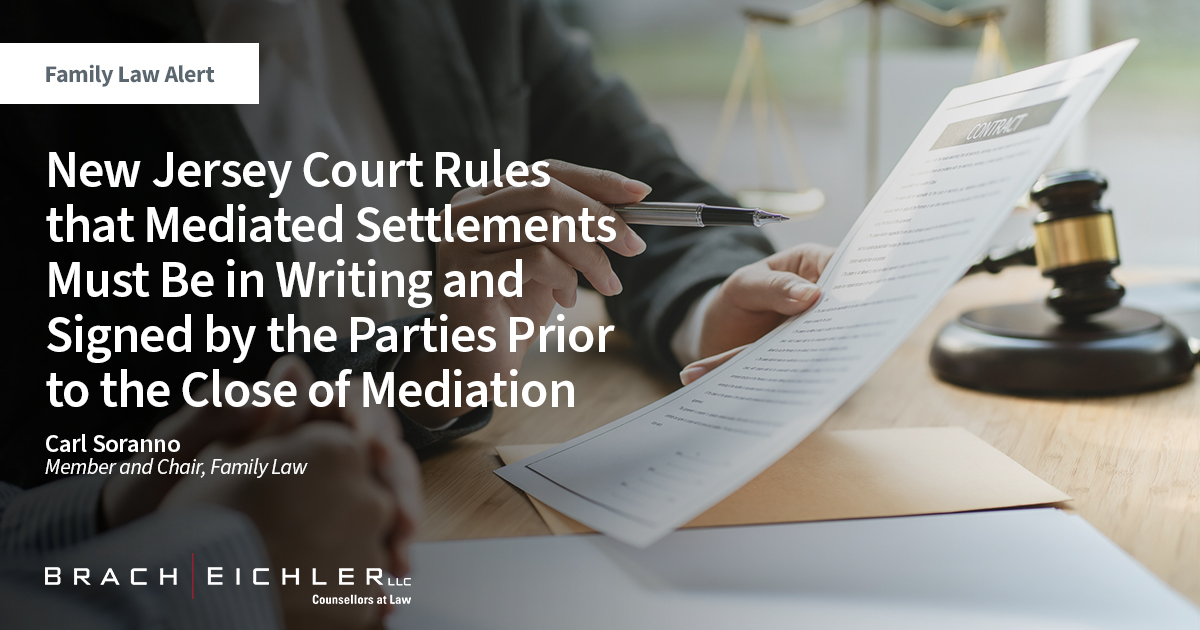

In an opinion approved for publication on March 28, 2023, the New Jersey Appellate Division held that a negotiated agreement reached during mediation is only enforceable if it is approved by the parties in writing and signed prior to the close of mediation. The Court affirmed the denial of a motion to enforce a settlement agreement reached by the parties in a voluntary mediation.
In this commercial dispute, the parties voluntarily agreed to mediate, which resulted in a draft settlement. However, a few hours after mediation ended, one of the plaintiffs advised she did not want to settle and would not sign the agreement. Defendants then moved to enforce the settlement reached at mediation. Plaintiffs, in their opposition, offered that they were prepared to honor the settlement if certain contingencies were met. The parties were unable to finalize an agreement and the Defendant’s motion to enforce proceeded. The trial court denied the Defendants’ motion to enforce finding, “the [m]otion to [e]nforce [s]ettlement is denied as moot because the parties failed to reach a valid agreement. The Court relied on the New Jersey Supreme Court opinion in Willingboro Mall, Ltd. v. 240/242 Franklin Ave., LLC, 215 N.J. 242, 262 (2013).
On appeal, the defendants argued that Willingboro only applies to court-ordered mediations, under R. 1:40-4(I), and not to voluntary mediations, citing case law in New Jersey that distinguishes court-ordered and voluntary mediation. Defendants also claimed plaintiffs’ conduct and communications subsequent to the mediation indicated acceptance of the settlement. The Appellate Division was unpersuaded, finding that this case is exactly the situation Willingboro addresses and that settlement through the mediation process only occurs when the parties agree in writing. The parties did not sign the draft settlement agreement and, therefore, it is unenforceable under Willingboro’s broad, bright-line rule. The Appellate Division also distinguished that while there is a distinction between the various forms of mediation, as indicated in N.J.S.A. 2A:23C-3, the differences are irrelevant when considering the policy behind the Willingboro decision. The Court here sent a clear message that for a mediated settlement to be enforceable it must be in writing and signed by the parties.
For more information on issues surrounding mediated settlement agreements, please contact:
About Brach Eichler LLC
Brach Eichler LLC is a full-service law firm based in Roseland, NJ. With over 80 attorneys, the firm is focused in the following practice areas: Healthcare Law; Real Estate; Litigation; Trusts and Estates; Corporate Transactions & Financial Services; Personal Injury; Criminal Defense and Government Investigations; Labor and Employment; Environmental and Land Use; Family Law; Patent, Intellectual Property & Information Technology; Real Estate Tax Appeals; Tax; and Cannabis Law. Brach Eichler attorneys have been recognized by clients and peers alike in The Best Lawyers in America©, Chambers USA, and New Jersey Super Lawyers. For more information, visit www.bracheichler.com.
This alert is intended for informational and discussion purposes only. The information contained in this alert is not intended to provide, and does not constitute legal advice or establish the attorney/client relationship by way of any information contained herein. Brach Eichler LLC does not guarantee the accuracy, completeness, usefulness or adequacy of any information contained herein. Readers are advised to consult with a qualified attorney concerning the specifics of a particular situation
*This is intended to provide general information, not legal advice. Please contact the authors if you need specific advice.